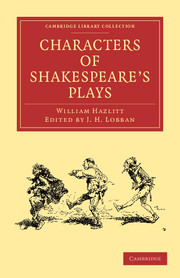Book contents
- Frontmatter
- Preface
- Contents
- Introduction
- Preface
- Cymbeline
- Macbeth
- Julius Cæsar
- Othello
- Timon of Athens
- Coriolanus
- Troilus and Cressida
- Antony and Cleopatra
- Hamlet
- The Tempest
- The Midsummer Night's Dream
- Romeo and Juliet
- Lear
- Richard II
- Henry IV
- Henry V
- Henry VI
- Richard III
- Henry VIII
- King John
- Twelfth Night; or, what you will
- The Two Gentlemen of Verona
- The Merchant of Venice
- The Winter's Tale
- All's Well That Ends Well
- Love's Labour's Lost
- Much Ado About Nothing
- As You Like It
- The Taming of the Shrew
- Measure for Measure
- The Merry Wives of Windsor
- The Comedy of Errors
- Doubtful plays of Shakespear
- Poems and Sonnets
- Notes
The Comedy of Errors
Published online by Cambridge University Press: 07 September 2010
- Frontmatter
- Preface
- Contents
- Introduction
- Preface
- Cymbeline
- Macbeth
- Julius Cæsar
- Othello
- Timon of Athens
- Coriolanus
- Troilus and Cressida
- Antony and Cleopatra
- Hamlet
- The Tempest
- The Midsummer Night's Dream
- Romeo and Juliet
- Lear
- Richard II
- Henry IV
- Henry V
- Henry VI
- Richard III
- Henry VIII
- King John
- Twelfth Night; or, what you will
- The Two Gentlemen of Verona
- The Merchant of Venice
- The Winter's Tale
- All's Well That Ends Well
- Love's Labour's Lost
- Much Ado About Nothing
- As You Like It
- The Taming of the Shrew
- Measure for Measure
- The Merry Wives of Windsor
- The Comedy of Errors
- Doubtful plays of Shakespear
- Poems and Sonnets
- Notes
Summary
This comedy is taken very much from the Mensechmi of Plautus, and is not an improvement on it. Shakespear appears to have bestowed no great pains on it, and there are but a few passages which bear the decided stamp of his genius. He seems to have relied on his author, and on the interest arising out of the intricacy of the plot. The curiosity excited is certainly very considerable, though not of the most pleasing kind. We are teazed as with a riddle, which notwithstanding we try to solve. In reading the play, from the sameness of the names of the two Antipholuses and the two Dromios, as well from their being constantly taken for each other by those who see them, it is difficult, without a painful effort of attention, to keep the characters distinct in the mind. And again, on the stage, either the complete similarity of their persons and dress must produce the same perplexity whenever they first enter, or the identity of appearance which the story supposes, will be destroyed. We still, however, having a clue to the difficulty, can tell which is which, merely from the practical contradictions which arise, as soon as the different parties begin to speak; and we are indemnified for the perplexity and blunders into which we are thrown by seeing others thrown into greater and almost inextricable ones.–This play (among other considerations) leads us not to feel much regret that Shakespear was not what is called a classical scholar.
- Type
- Chapter
- Information
- Characters of Shakespeare's Plays , pp. 247 - 249Publisher: Cambridge University PressPrint publication year: 2009First published in: 1908

